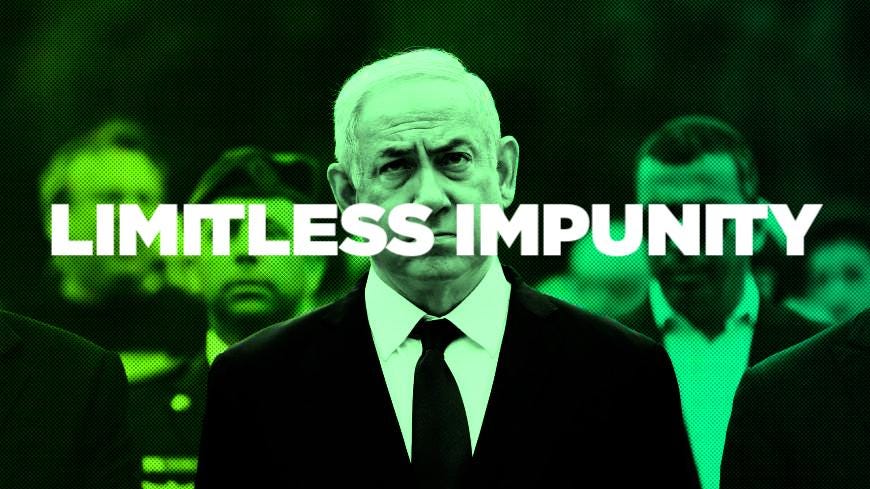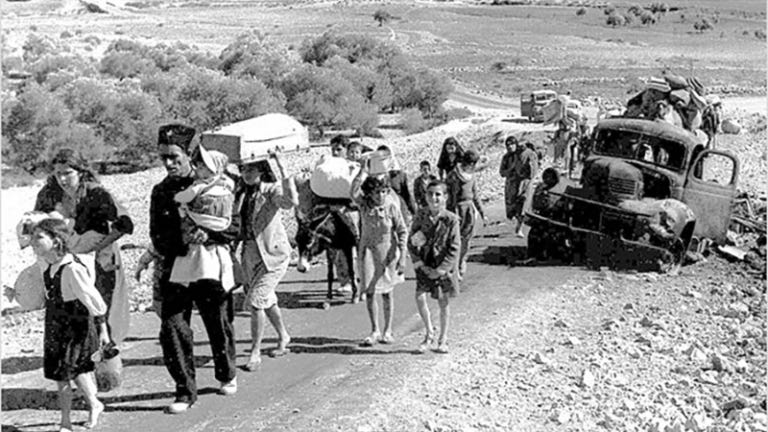Israel's Impunity Lies In Zionist Myths
It is not coincidental that those who attempt to scrutinize Zionism—its roots, history, and ongoing influence—often face intimidation and threats.
Recent actions against pro-Palestinian demonstrators in the United States and Germany have highlighted a significant contrast between what Western governments want and where the reality of Israel lies
In the United States, protests have been marked by a heavy police presence and numerous arrests. Demonstrations, particularly on college campuses, have faced increased scrutiny and backlash, with several universities resorting to calling anti-terrorist police to dismantle peaceful college encampments. The University of California, Berkeley, for example, experienced intense clashes between pro-Palestinian activists and law enforcement, resulting in numerous detentions and heightened security measures.
In Germany, the response to pro-Palestinian protests has been similarly forceful and shameful. Berlin has seen several high-profile incidents, including the clearing of around 150 protesters from Humboldt University by police. The protesters, who occupied the university’s Institute for Social Sciences, were removed after negotiations with university officials broke down. German authorities have taken to brutalizing demonstrators in ways not seen in Berlin since Nazi Germany, often citing concerns about anti-Semitism and public order. The police response has included detaining activists and raiding properties, with significant numbers of criminal cases and investigations initiated against demonstrators.
These actions represent a severe restriction on freedom of speech and assembly. In Germany, the crackdown has been particularly stringent, with authorities invoking laws originally designed to combat hate speech and Nazi propaganda to justify actions against pro-Palestinian activists. This has led to what some describe as "Zionist McCarthyism," with activists facing legal consequences for slogans and social media posts deemed anti-Israeli.
Overall, the heavy-handed responses in both countries reflect the zionist influence over Western governments. They also raise important questions about the balance between maintaining public order and protecting democratic freedoms. The United States and Germany have gone to the extent of firing academics, students, and employees for the sake of maintaining Israeli propaganda and face. In both countries, severe laws have been introduced and passed that particularly target Arabs, Muslims, anti-Zionist Jews, and anyone else who dares to stand up to Israeli narratives in the face of a brutal genocide.
However, this has always been the response against those who try to reveal the ugly underbelly of Zionism. For instance in 1988, when organizers announced a public meeting on the Palestinian issue during a KPFK radio interview in Los Angeles, they were inundated with bomb threats from anonymous callers.
In the United States and Western Europe, disseminating information about Zionism or discussing specific events related to its political movement is challenging and often a steep uphill battle. Organizers and speakers are often accused of anti-Semitism or, if they are Jewish, of self-hatred.
This widespread hostility and slander against anti-Zionists arise because of the stark contrast between the official narrative about Zionism and the Israeli state, and the harsh realities of this colonial ideology and its coercive practices. People are often shocked when they learn about the century-long persecution of Palestinians, prompting Zionist apologists to fervently prevent any coherent, impartial examination of Zionism's extreme and chauvinistic history.
Ironically, a close study of Zionist writings and statements, particularly those intended for internal audiences, leaves no doubt about their actions and their political stance from the late 19th century to today.
Five predominant myths have shaped public perception of Zionism:
"A land without a people for a people without a land": This myth was meticulously crafted by early Zionist leaders to create the illusion that Palestine was an uninhabited, barren region, devoid of any significant population and thus ripe for Jewish settlement. This fabrication served a strategic purpose, as it provided a moral justification for the colonization of Palestine by suggesting that the land was underutilized and neglected, awaiting a people to develop it
This misleading assertion was quickly followed by a systematic denial of the existence of a distinct Palestinian identity, nationhood, or any legitimate claims to the land. Zionist rhetoric and policies effectively erased the historical and continuous presence of the Palestinian people in the region, disregarding their deep-rooted cultural and social ties to the land. This denial was not merely rhetorical; it was manifested in various forms of policy and practice aimed at delegitimizing Palestinian claims and suppressing their national aspirations.
By promoting this myth, the Zionist movement sought to garner international support and sympathy for the establishment of a Jewish homeland in Palestine, while simultaneously undermining and marginalizing the indigenous Palestinian population. This strategy involved portraying the Palestinians as a non-existent or insignificant entity, thereby negating their rights and historical presence in the land they had inhabited for centuries
.Unfortunately, this myth has been so pervasive that today Palestinians are deemed terrorists in their land of historic Palestine and the later manufactured Palestinian “territories” of West Bank, Gaza and East Jerusalem.
Israeli Democracy: The second prevailing myth is that of Israeli democracy. Countless newspaper articles and television programs frequently refer to Israel as the sole "real" democracy in the Middle East, lauding it as a beacon of democratic values in a region often characterized by authoritarian regimes. This portrayal, however, starkly contrasts with the lived realities within the Israeli state, where the democratic principles of civil liberty, due process, and basic human rights are systematically denied to those who fail to meet specific racial and religious criteria.
In practice, Israel's version of democracy bears significant resemblance to the apartheid regime that once governed South Africa. Just as South African apartheid was built on a legal framework that discriminated based on race, Israel maintains a structure of laws and policies that privilege Jewish citizens while marginalizing Palestinian Arabs. These legal and systemic inequalities manifest in various aspects of life, including access to resources, freedom of movement, and political representation. For instance, Palestinian citizens of Israel face significant barriers to obtaining building permits, experience higher rates of home demolitions, and endure restricted access to their ancestral lands. Additionally, the Israeli legal system includes 80 laws that explicitly differentiate between Jewish and non-Jewish citizens, perpetuating a state of institutionalized discrimination.
This myth of Israeli democracy persists in international discourse, largely unchallenged, despite the extensive documentation of human rights abuses and discriminatory practices by organizations such as Human Rights Watch and Amnesty International. By maintaining this façade of democracy, Israel garners international support and legitimacy, which in turn enables the continued implementation of policies that contravene fundamental democratic values and human rights principles.
You would have seen this myth repeatedly regurgitated by Western politicians and ambassadors at the United Nations every time the issue of Palestine comes up.Security: The third myth revolves around the notion that "security" is the primary driving force behind Israeli foreign policy. Proponents of this myth assert that Israel must maintain its position as the fourth largest military power in the world due to an incessant need to defend itself against the purportedly irrational and inherently hostile Arab populations surrounding it. This narrative often paints Palestinians and Arabs in a dehumanizing light, characterizing them as primitive and consumed by hatred, suggesting that they pose a constant and existential threat to the Israeli state.
This portrayal serves to justify the extensive militarization of Israel and its aggressive foreign policy stance. It positions the state's actions as necessary and defensive rather than expansionist or oppressive. By framing security concerns in such a manner, Zionist advocates aim to garner international sympathy and support, particularly from Western nations that may resonate with the rhetoric of combating extremism and terrorism.
However, this myth conveniently overlooks several critical factors, including the power dynamics at play and the historical context of the Israeli-Palestinian conflict. It disregards the substantial military aid and technological support Israel receives from its allies, particularly the United States, which significantly bolsters its military capabilities. Additionally, this security narrative often obscures the impact of Israeli policies on Palestinian populations, such as the expansion of settlements, the blockade of Gaza, and the numerous Israeli military incursions and abuses that exacerbate tensions and perpetuate cycles of violence.
By emphasizing a perpetual state of emergency, this myth of security not only rationalizes the heavy militarization of Israeli society but also deflects attention from the underlying issues of occupation and the denial of Palestinian self-determination. It constructs a simplified and one-sided view of the conflict, which omits the legitimate grievances and aspirations of the Palestinian people, thereby perpetuating a skewed perception of the realities on the ground.
This myth feeds the narrative of "Israel has the right to defend itself”. You would have noticed that Israelis and their supporters start every answer to ANY question with this blanket statement, giving Israel a carte blanche to commit war crimes at a scale not witnessed since the Vietnam War.Zionism as the Heir to Holocaust Victims: The fourth myth, perhaps the most disingenuous and insidious, posits Zionism as the moral heir to the victims of the Holocaust. This narrative has been meticulously cultivated by ideologues of the Zionist movement, who have draped themselves in the collective memory of the six million Jews who perished under Nazi tyranny. This myth leverages the profound tragedy of the Holocaust to assert a moral high ground, suggesting that the establishment and actions of the State of Israel are a direct and justified response to this unparalleled historical atrocity.
However, the bitter and cruel irony of this claim lies in its stark dissonance with historical realities. From its inception, the Zionist movement engaged in actions and negotiations that can be seen as colluding with elements of Nazism. This aspect of Zionist history is often overlooked or deliberately obscured, yet it is crucial for understanding the complex and sometimes contradictory dynamics at play.
For instance, during the early years of Nazi rule, certain Zionist factions sought to negotiate with the regime to facilitate Jewish emigration to Palestine. The Haavara Agreement of 1933 is a notable example, where Zionist leaders struck a deal with Nazi Germany to enable the transfer of Jewish assets to Palestine, thereby aiding the Jewish settlement there. While this agreement did provide a means for some Jews to escape persecution, it also involved a level of cooperation with a regime that was already enacting its genocidal policies and most Jews who were not deemed important enough for the Zionist leaders were indeed the victims of the Nazi Holocaust.
By claiming the mantle of Holocaust legacy, the Zionist movement aims to shield itself from criticism and frame its actions within a context of existential necessity and moral righteousness. This appropriation of the Holocaust legacy not only distorts the historical record but also manipulates the profound suffering of the Jewish people for political and ideological ends.This myth of moral inheritance thus serves to deflect scrutiny from the actions and policies of the State of Israel, particularly regarding its treatment of Palestinians. It creates a narrative in which any critique of Zionism or Israeli policy is construed as an affront to the memory of the Holocaust victims, thereby stifling open and honest discourse about the realities of the Israeli-Palestinian conflict.
Zionism is Judaism: since October 7th, you have probably seen this myth circulated a billion times by Israelis and supporters of Israel. This myth helps Israelis and their supporters to demonize and smear anyone daring to hold Israel accountable as antisemites. ‘Zionism is Judaism’ is a myth that has been weaponized grotesquely by Israel and Western political establishment. So we asked a popular anti-Zionist Rabbi to list the main differences between Zionism and Judaism.
Zionism and Judaism, while interrelated, are distinct concepts. Judaism is an ancient monotheistic religion encompassing a wide array of cultural, ethical, and religious practices of the Jewish people. It is rooted in the Torah and has a history that spans thousands of years.
Zionism, on the other hand, is a political movement that emerged in the late 19th century to establish a Jewish homeland in the territory defined as the Land of Israel. This movement was largely a response to anti-Semitic persecution in Europe and the desire for a safe and sovereign state for Jews.
The key differences between the two are:
Nature and Origin: Judaism is a religion with spiritual, moral, and cultural dimensions, while Zionism is a modern nationalist fascist and political ideology.
Scope: Judaism encompasses all aspects of Jewish life, including faith, practice, and identity. Zionism specifically focused on the political aim of establishing and supporting a European Jewish state.
Adherence: Not all Jews are Zionists; some Jews may oppose Zionism on religious, philosophical, or political grounds. Conversely, some non-Jews support Zionism.
In summary, while Judaism and Zionism can overlap in the lives of many Jewish individuals who support the state of Israel as part of their identity, they are not synonymous. Judaism is a comprehensive religious tradition, whereas Zionism is a political movement with a specific apartheid objective.
To many, it seems paradoxical that the Zionist movement, which perpetually evokes the horror of the Holocaust to justify its actions, would have engaged in active collaboration with the very regime that orchestrated the genocide of six million Jews. Yet, historical records indicate that this alliance was not merely one of pragmatic convergence but also reflected a profound ideological congruence. Both Zionist leaders and Nazi officials shared a form of extreme chauvinism, albeit for different ultimate goals, which facilitated their temporary cooperation.
A complex blend of desperation and ideological conviction drove the Zionist leadership's interactions with the Nazi regime. For instance, the Haavara Agreement of 1933, which facilitated the transfer of Jewish capital from Germany to Palestine, illustrates a willingness to negotiate with the Nazi regime to further Zionist aims of Jewish settlement in Palestine. This accord, while providing a lifeline for some Jews, simultaneously offered economic benefits to the Nazis and demonstrated an unsettling level of accommodation.
This collaboration extended beyond mere economic transactions. The ideological overlap between Zionist and Nazi objectives was rooted in their mutual endorsement of ethnic nationalism. The Zionists sought to create a homogenous Jewish state in Palestine, a vision that paralleled the Nazis' own racial purification goals. This shared perspective on ethnic separation and nation-building underpinned their interactions, even as their methods and ultimate aspirations diverged drastically.
The Zionist movement's pragmatic dealings with the Nazis underscore a stark and often troubling chapter in its history. Examining these collaborations uncovers the complex and sometimes contradictory forces that shaped the Zionist project. This aspect of Zionist history challenges the simplistic narrative of moral righteousness often associated with the movement, revealing the multifaceted and occasionally morally ambiguous strategies employed in pursuing statehood.
In conclusion, the five dominant myths surrounding Zionism – a land without a people, Israeli democracy, security-driven foreign policy, and moral succession of Holocaust victims – have shaped societal perceptions, obscuring the truth about the movement's actions and political stance. The tragic irony of Zionism's collaboration with Nazism, despite its invocation of Holocaust horror, underscores the deep ideological affinity rooted in their extreme chauvinism. It is crucial to promote a coherent, dispassionate examination of Zionism's virulent and chauvinist record to foster a better understanding of the century-long persecution of Palestinians and the true nature of the Zionist movement.
Addressing the evils of today’s Zionist project is a necessity to ensure we do not watch and facilitate another Holocaust, this time of the Palestinians by those who use the Holocaust of Jews as a shield against consequences. Nazi Germany lost the World War II and was dismantled into two separate countries. It is time for the Zionist, fascist and racist project of Israel to be looked at as another Nazi Germany-like entity that poses the threat of World War III in our lifetimes.








No matter where it lies it is undeniable that this impunity was given and supported by US and its allies. The greatest injustice ever. You commit crimes you pay and impunity plays no role. End of story. Who gives a damn what US gives away? Not theirs to do. So simple. We reject impunity and international law is for everyone.
The Nation Magazine May 16, 2024
The Israel-Affiliated Organization Leading the Backlash Against Student Protests
🩸PROJECT ISRAEL CYBER SHIELD
. . . . For years, the IAC Israeli-American Council, was largely financed and led by Las Vegas mega-billionaire Sheldon Adelson, the top contributor to the 2020 Trump campaign
. . . . . . a web of secretive troll farms across the US directed from Israel. . . to encourage pro-Israel students to download an Israeli app through which they could respond to Israeli government-directed “missions” to secretly target and harass critics of Israel.
By 2018, the operation had opened Israel-directed troll farms across the US and was completing 1,580 missions a week. . . .
Secrecy, however, is paramount. “Ninety percent of the people who pay attention to this space very closely have no idea what we’re actually doing, which I like,” he said. “We do it securely and anonymously, and that’s the key.”
https://www.thenation.com/article/activism/israeli-american-council/